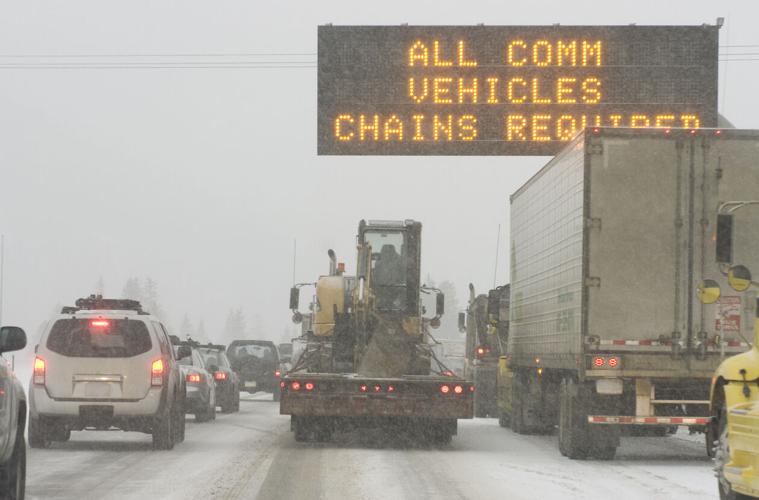CDOT predicts heavy traffic on Interstate 70 in the mountains this weekend
The Colorado Department of Transportation is predicting heavy traffic along the Interstate 70 mountain corridor this weekend.
With the help of an historical log of traffic along one of the major travel corridors in Colorado, CDOT tries to predict expected traffic on any given weekend throughout the winter season.
The last year that New Year’s Day fell on a Wednesday was 2019/2020 when records were set at the Eisenhower Johnson Memorial Tunnels. In 2020, major snow storms hit the Colorado mountains leading into the holiday.
Smaller snow events are expected each day this year. CDOT predicts that fresh snow will drive ski traffic, which will combine with travelers returning from the holidays, potentially leading to traffic jams through the weekend.
Over the New Year’s weekend in 2020, the fifth highest combined 24-hour traffic count for both eastbound and westbound traffic saw 55,224 vehicles through the tunnels on Jan. 3.
The highest combined hourly count was on Jan. 3 as well, with 6,259 vehicles traveling through at 6 p.m. The highest eastbound hourly count of 4,076 vehicles occurred at 6 p.m.
Jan. 4 saw the second highest combined eastbound and westbound hourly count through the tunnels in 2020, with 5,850 vehicles.
The third highest eastbound hourly count with 3,762 occurred on Saturday at 4 p.m.
The post-New Year’s Day weekend of 2020 saw the fifth highest non-holiday winter weekend with 154,541 vehicles traveling through the tunnels, far and away more traffic than in January 2023. It only had an average daily total of 36,373 vehicles passing through the tunnels for the entire month.
“While traffic counts could vary this weekend compared to 2020, there is a high chance that traffic counts and volume will be similar or may exceed the records set four years ago. Motorists should be prepared for extended delays and map out their travel strategy beforehand if they need to be somewhere at a specific time,” said the CDOT release
CDOT provides some tips for those headed into the mountains this year, including booking a ticket with CDOT’s Bustang, Snowstang and Pegasus services where riders can enjoy free WiFi and other conveniences.
The Winter Park Express train, with its new expanded schedule and lower prices, offers a unique way to head up to the high country and bypass traffic.
The TreadShare app can provide carpooling to your favorite Colorado destinations, year-round.
CDOT resources including COtrip.org, the COtrip Planner app and GoI70.com can ease travel planning stress. COtrip will allow you to see road conditions and traffic speeds. It will also provide critical information related to any road closures or chain and traction laws that may be in effect.
GoI70.com is a great resource to map out the latest travel forecasts, which will help inform drivers when to leave to avoid heavy traffic.
Drivers should remember that fines for weaving in and out of the I-70 mountain corridor express lanes start at $75 and increase to $150 if not paid within 20 days.
Drivers should also remember that Colorado’s new hands-free law is now in effect. The law prohibits drivers from using a mobile electronic device while driving, though hands-free accessories are permitted. The new law expands the ban on using cellphones beyond just texting. It now includes holding or manually using a phone or other mobile device for voice calls or any other reason, requiring all drivers to use a hands-free device.
Penalties for violating the law start with a $75 fine and two license suspension points for the first offense.
Winter travel tips for motorists from CDOT
• Avoid or limit driving during the brunt of the storm. Many areas of the state will experience pavement impacts and blowing snow due to strong winds.
• Work from home if you can.
• If you plan to travel, know before you go by checking out the latest weather conditions and visiting COtrip.org for road conditions (see info sources below).
• Make sure your vehicle is winter ready with the appropriate tires for the weather and have a snow emergency kit.
• Once you are out on the road, take it slow, no sudden stops and leave plenty of following distance.
• Give plows space! Stay back three to four car lengths from snow plows.
Safety closures
A safety closure is a precaution taken during inclement weather to reduce the probability of traffic incidents, increased congestion or other safety-related factors. During a safety closure, traffic may be stopped on the interstate, turned around or directed to an exit. Safety closures help decrease delay times, and, above all, keep travelers safe.
Chain and traction laws
When weather conditions warrant, CDOT will activate the traction law. If weather conditions deteriorate, CDOT will activate chain laws for passenger and commercial vehicles. Motorists will be alerted to an active traction or chain law by highway signage, COtrip.org and traffic/roadway condition alerts. For more information, visit codot.gov/travel/winter-driving/traction law.
To learn more and view helpful tips for winter driving, visit winter.codot.gov.
Know before you go
Travelers are urged to “know before you go.” Gather information about weather forecasts and anticipated travel impacts and current road conditions prior to hitting the road. CDOT resources include:
• Road conditions and travel information: COtrip.org
• Download the COtrip Planner app: bit.ly/COtripapp
• Sign up for project or travel alerts: bit.ly/COnewsalerts
• See scheduled construction lane closures: bit.ly/laneclosures
• Connect with @ColoradoDOT on social media: Twitter, Facebook, Instagram and YouTube
• Chain and traction law information: www.codot.gov/admin/travel/winter-driving/tractionlaw
• Check avalanche conditions at CAIC: www.avalanche.state.co.us






![[VIDEO] Man catches fish while stuck in infamous I-70 traffic in Colorado](https://wpstage.denvergazette.com/wp-content/uploads/2025/01/645c11d814650.image_.png)